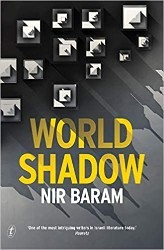Originally published in Hebrew in 2011, The Drive won two major Israeli prizes: the Ministry of Culture Prize and the Sapir Prize for debut fiction. Its author, Yair Assulin, has since become a consequential voice in Israel through his regular column in the liberal newspaper Haaretz. Hence, the English version of the novel, ably translated by Jessica Cohen, comes weighted with cultural significance. It’s an intense, compact work that presents a point of view on Israeli life that may be unfamiliar and quite surprising to non-Israelis.
The unnamed narrator of The Drive is a young man doing his required service in the Israeli Defense Forces. Internally tortured, and deeply dissatisfied with his assignment in an army intelligence unit, he is impelled almost to the point of self-harm. His requests for a change of assignment have been rejected by his superior officers, and the novel traces his thoughts as he drives with his father from Haifa to Tel Hashomer Hospital in order to see a mental health officer who he hopes will provide him with a way out.
On one level, the novel presents a version of the eternal conflict between the individual and society. Israel requires its young to serve in a military that values conformity just at the time when they wish for independence, and the narrator offers a stinging indictment of what is usually regarded as one of Israel’s crowning achievements: a democratic and egalitarian national service. Beyond the idealistic propaganda, the protagonist feels, lies a soul-crushing experience. He rejects the values of military service as “a big show,” and finds “all the talk about protecting the homeland and giving back to the country was the empty rhetoric of people seeking respect” — like the lieutenant colonel in his unit, whom he remembers from years before as a pitiful, shambling substitute teacher. He is also critical of the role of the army in what Israelis refer to as ha matzav (the situation), brought about by Israel’s occupation of the West Bank and the Palestinians’ resistance. The sense of futility evoked by participating in this state of affairs is summed up by the narrator’s main assignment in his unit: laminating maps of West Bank towns.
Is the narrator motivated by genuine feelings of disgust at a corrupt system or is he, like many people his age, reacting viscerally to hypocrites and “phonies” — to quote J. D. Salinger’s hero in The Catcher in the Rye,whom he somewhat resembles? Assulin’s protagonist sees himself as a lone truth-teller while everyone else exploits the system to inflate their ego or to gain some advantage. He is also somewhat of an oddball in his unit because he is religiously observant, although that aspect of his identity is not fully developed. Ultimately, one wonders whether the protagonist is a reliable narrator or, whether he is, as his loyal and long-suffering father comments toward the end of the novel, “really … a bit of a narcissist.”
These two possibilities are held in tension through the course of the short narrative, and the reader (or at least this reader) is hard-pressed to determine where the truth lies. Even in its ambiguity, The Drive reveals facets of modern Israeli culture not usually known outside of Israel. It is a major addition to New Vessel Press’s growing list of significant translated fiction (including substantial representation from Israel) that would otherwise remain hidden from English-language readers.




